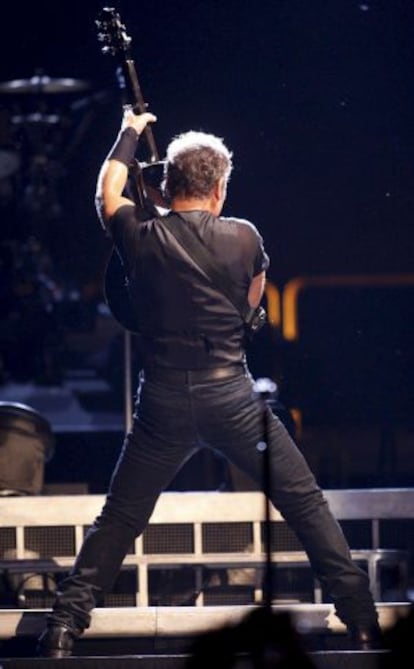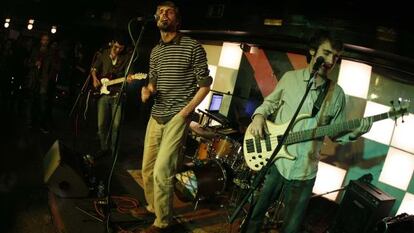The slow death of live music
The 13-point VAT hike on culture is also affecting concert promoters The industry is predicting a 50-percent fall in earnings this summer


Beyoncé will not bring her world tour to Spain this summer. Nor will Leonard Cohen or Paul McCartney. After playing five concerts here in 2012, Bruce Springsteen will only give one this year. And that's "because he likes coming," say the people bringing him.
The big concert promoters have lost their muscle when it comes to attracting major pop stars to Spain, while smaller outfits cannot risk failure with an unknown artist.
Besides the general economic crisis, the main cause is the 13-point rise - from eight to 21 percent - in the value-added tax (VAT) rate on culture, which the government introduced last September. The aim was to boost the state's coffers, but the result has been plummeting ticket sales and, what's more, plummeting income for the administration that taxes them.
This summer - which is the most important time of the year for live music - promoters could see their earnings fall by up to 50 percent on last year.
The response from the sector is overwhelmingly united: the government must rectify the situation as soon as possible.
After the VAT rise
- The average fall in tax revenue from ticket sales since the VAT increase came into force has been 27.51 percent. March was the worst month, with a 42-percent fall. But the most pessimistic predictions paint a worse picture of a drop of up to 50 percent over the summer.
- According to the promoters' study, the Spanish government has collected 8,996,913.99 euros from the industry with the VAT hike. But it has lost income tax and Social Security revenue to the tune of 11,759,740.91 euros.
- Germany and France apply a VAT rate of seven percent to cultural performances; in the UK it goes up to 20 percent. The Spanish rate is at the top end.
- The music promoters and agents' associations predict the worst summer in recent history with a possible 50-percent fall in ticket sales compared with last year. Some of the big festivals are surviving thanks to attendees coming from abroad.
According to a study carried out by the two main industry associations, APM (music promoters) and Arte (agents and directors), which bring together 400 companies, earnings from ticket sales fell 28.2 percent between September and December of last year, 17 points above the yearly average. In March, just as the most important time for concerts begins, net earnings plummeted 42.19 percent.
Rather than helping it with stimulus measures, the industry believes the government has definitively condemned it. As Culture Minister José Ignacio Wert admitted last week, the VAT rise has "really" affected show attendances.
"The problem is, Spain is losing the race in a competitive market," says the president of Arte, Emilio Santamaría. "They are putting all the spokes in our wheel. They are forcing us to stay at home because we cannot lose any more now. We have adapted, lowered budgets... but we are completely drowning. You have to go back to what is logical. If the aim was to collect taxes, they have failed. Please change course."
The amount of VAT collected has, logically, increased in recent months. But the sum of all the taxes that the government has taken from the music industry has fallen 2.7 million euros, say those affected. How can that be? More than 100 music promotion companies have been forced to close or shed staff as a consequence of the VAT increase. As a result, income tax contributions are down and Social Security spending is up because of unemployment.
Spain has become a favorite destination for concert tourism in the last few years and the economic impact that a live-music event can have for a city can reach 65.3 million euros in the case of the Primavera Sound festival in Barcelona. "All events bring great economic and social benefits to their city. Hotels, merchandising, restaurants, transport... and that is proportional to the audience it manages to get together," says APM president Pascual Egea.
Promoter Doctor Music, which has been in the business for 30 years, has seen its earnings drop 30 percent as a result of the VAT hike. It has put projects on hold and managed to hang on with the help of the cushion it built up in the good times. "The VAT rate would have to be super-reduced [four percent]; that way, tax revenues will increase," says company founder Neo Sala. "Admit it: in the entire package of measures, one slipped in that was a mistake. It doesn't matter - wise men always admit when they're wrong. In the Netherlands, France and Portugal the same thing happened and they took a step back."
Madrid loses a Nasti night out

The legendary Madrid nightclub Nasti, located in the popular partying district of Malasaña, is to close. On July 27, the venue will no longer host the concerts and DJ nights organized by the Nasti group, comprising Pablo Soler (one of the four founding partners of the Primavera Sound festival), Chema García and Carla García. The closure comes 13 years after it first opened its doors, with the Nasti name a rebranding of the equally legendary Sala Maravillas, which was run by Miguel and José Morán, the brothers behind the Benicàssim Festival.
One of Nasti's managers, Chema García, explained the reasons for the closure on Tuesday. "Since 2007, when there were a series of misunderstandings with the council, and we had to close the club at 3am instead of 6am, we have been left with a series of debts, which we have been able to manage. But since last year, with the rise in VAT, people seem to prefer staying at home and spending less on drinks. And now that is having an effect on us."
"Put simply, everything is more expensive," adds Carla García. "And when they reduced our legal capacity from 200 to 110, we really suffered. We had to juggle everything to make ends meet. And what's more, the Chinese beer-sellers were outside - even I have bought a few cans from them. We just can't make the numbers work. And at that point you lose all your enthusiasm."
Nasti will be getting a new name, and will be taken over by a group of "girls who have a few places in Chueca." And that's all that they're revealing for now. "I have no idea what style the place will have," says Chema. "We will carry on working in the music sector, but we won't be running a venue," adds Carla García.
In order to give the place a proper send-off, Nasti will be putting on three special concerts. On July 13, 20 and 27, a selection of Spanish bands who have a special connection with the place will be playing.
On their Facebook page, they've explained the closure with the following statement: "It's all over friends, we will be closing on July 27, after 13 years of giving it our all. Changes to our legal capacity, the anti-smoking law, two policemen, a rise in taxes... Living in the city of Madrid is getting more and more difficult, and the things that we have to do to carry on are ever more complicated, and we've ended up without lives. [...] Times are changing and so are we. A million, billion thank yous to all of you, from the bottom of our hearts. Farewell."







































